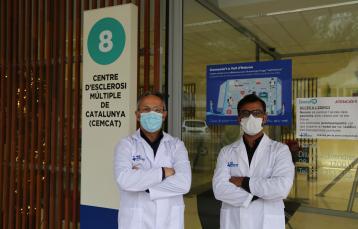The Guide has been published in the two official journals of each institution, Multiple Sclerosis Journal and European Journal of Neurology.
The aim of the committee of experts who have participated in the development of this guide has been to homogenize the decision-making process in the treatment of MS providing health professionals a solid support document in the decision-making process with respect to drug treatments currently available. The guidelines cover the treatment in adult patients, the clinically isolated syndrome (CIS), control of the response to treatment, the interruption and the change of therapeutic strategy and treatment in special situations such as pregnancy.
To make the 20 recommendations that are in the guide the method GRADE was used, that consists in the evaluation of the quality of the evidence and the benefit/risk compensation in a process of consensus in two phases. In this way, first the recommendations were drawn up, in favour or against, the use of each drug and after it was determined the grade of recommendation, strong or weak, in accordance with the evidence or consensus statement.
For the preparation of the Guide there were taken into account all medicines switchers of the course of the disease approved by the European Medicines Agency at the time of publication.
Multiple Sclerosis
Multiple sclerosis is a demyelinating inflammatory disease of the central nervous system that is characterized by inflammation, demyelination and degenerative evolution. It usually appears between the ages of 20 and 40 years old and affects more women than men, by a ratio of 2-3 women for every man. It is estimated that there are about 700.000 people affected in Europe for which there is currently no curative treatment. Between 85% and 90% of people with MS present remittent-recurring and secondary progressive forms, while the primary progressive form is presented in 10-15%.
In January 2018, the EMA has approved the use of the ocrelizumab to treat primary progressive MS. This new addition represents a milestone of great importance because it is not until then we had no drug to help to slow down the evolution of the disease in this group of people who experienced a very quick and aggressive evolution.
Multiple Sclerosis Centre of Catalonia
The Multiple Sclerosis Centre of Catalonia, Cemcat, is part of Vall d'Hebron Barcelona Hospital Campus and is a pioneer in the diagnosis and treatment of multiple sclerosis. It commits to the comprehensive care of patients and promotes clinical research that is carried out in the centre.
Thanks to the joint clinical sessions, the Cemcat establishes a link between professionals from different disciplines. So, we involve all health care equipment and we maintain a continuous relationship with other areas involved, for the benefit of patients.
One of the innovations of the Cemcat is the Laboratory for Independent Life, which develops the occupational therapy service. The goal is to help patients return to daily life in a space of 35 m2 that reproduces an accessible and automated apartment. In this way, people will learn to adapt their movements to the environment.
